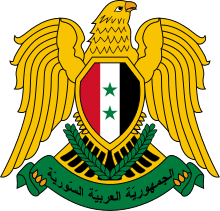Preamble and Chapter 1 of the Syrian Constitution
| Syrian Arab Republic |

This article is part of the series: |
| Text of the Constitution Arabic, English |
|---|
| Preamble and Chapter 1 Basic Principles |
| Chapter 2 Powers of the State |
| Chapter 3 The Judicial Authority |
| Chapter 4 General and Transitory Provisions |
|
Other countries · Law Portal |
The Preamble and Chapter 1 of the Syrian Constitution is the first part of the Syrian constitution introduced on 13 March 1973. It discusses the basic principles governing all citizens of the Syrian Arab Republic.
Preamble
The preamble contains the five main principles of the constitution. First, it defines the Arab nation's aspirations in unity, freedom and socialism and stipulates that the means to achieve these aspirations lie in the wider Arab revolution. Second, within the reality of a divided Arab nation, collective defense will be needed to counter the dangers of imperialism and Zionism. Third, affirms the nation's commitment to the march toward the establishment of socialist order. Forth, stipulates that individual freedom is a sacred right and that popular democracy is the "ideal formulation which insures for the citizen the exercise of his freedom." Fifth, states that the Arab revolution is an integral part of the wider world liberation movement for freedom, independence and progress.[1]
This constitution serves as a guide for action to our people's masses so that they will continue the battle for liberation and construction guided by its principles and provisions in order to strengthen the positions of our people's struggle and to drive their march toward the aspired future.[2]
Chapter 1
Chapter 1 contains 49 articles in four parts and provides the political, economic, educational, and cultural principles and the fundamental rights.[1]
Political Principles
The first article of the constitution states that "the Syrian Arab Republic is a democratic, popular, socialist, and sovereign state. No part of its territory can be ceded."[2] Article 3 stipulates that Islamic jurisprudence shall be a (not the) main source of legislation.[1] The article was later amended to include that the president must be of the Islamic faith. The constitution does not declare Islam as the state religion.[3] Article 4 declares that Arabic is the official language of the Syrian Arab Republic and that Damascus is the capital of the nation. Article 8 of the constitution defines the Baath Party as the "leading party in the society and the state,"[2] and presents the National Progressive Front as the only framework for legal political party participation for citizens.[4]
Economic Principles
The constitution defines the state economy as a planned socialist economy which aims to end all forms of exploitation. Three forms of property is presented by the constitution: public, collective and individual property. The constitution guarantees that private property shall not be expropriated except for the public interest and in return for fair compensation.[3]
Educational and Cultural Principles
Article 21 of the constitution defines the goals of the educational and cultural system:
The educational and cultural system aims at creating a socialist nationalist Arab generation which is scientifically minded and attached to its history and land, proud of its heritage, and filled with the spirit of struggle to achieve its nation's objectives of unity, freedom, and socialism, and to serve humanity and its progress.[2]
Freedom, Rights and Public Duties
The constitution distinguishes between universal human rights that apply to every human being and those that apply to Syrian citizens only. The constitution guarantees the freedom of expression, assembly and religion for all citizens. It stipulates that the state is the guarantor and protector of the citizen's personal freedom and dignity. The constitution guarantees that all citizens will be equal before the law in their rights and duties. It also states that work is a right and duty for every citizen and that the state will undertake to provide work for all citizens.[4]
References
Bibliography
- Robbers, Gerhard (2007). Encyclopedia of World Constitutions. Facts on File library of world history. New York: Facts On File. ISBN 978-0-8160-6078-8.